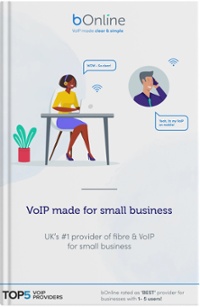
Traditional landlines are shutting down in favour of VoIP phone systems. As expected your small business may have questions regarding this change and how it will impact your existing business communications.
We have everything there is to know regarding the shift and how your business can prepare before 2025. Including an explanation of the process and alternatives to traditional landlines to best minimise disruption to your small business.
So, what is exactly changing?
The Public Switch Telephone Network (PSTN) supports a number of Openreach products such as line rental, broadband and call package deals. These include Integrated Services Digital Networks (ISDNs)
Now Openreach is making the move to Session Initiation Protocol (SIP) meaning there will no longer be a requirement for fixed-analogue services in the coming years and traditional fixed lines will cease to exist.
September 2023: Stop-sell; making of ISDN products will be withdrawn for new SIPs.
December 2025: Landlines become obsolete and businesses and homes will have to switch to cloud Voice Over Internet Protocol (VoIP) telephone.
How will this affect your business?
Public Switched Telephone Network (PSTN) still account for 81% of homes and businesses
We understand how important reliable and stable telephony is for small businesses and this will undoubtedly shake up your communications.
Although you don’t have to wait until 2025 to switch your telephony to the cloud. In fact, your business can take steps to future-proof your business now.
What is the alternative?
If you haven’t started already, your business will need to start looking at alternative solutions.
There is one main solution, Voice Over Internet Protocol (VoIP) a system that uses the internet to route your calls in one way or another making communications future-proof.
Introducing VoIP
Using the internet, Voice over Internet Protocol (VoIP) is a system allowing the transmission of data and voice to be made over an internet connection.
There are primarily two types of VoIP cloud phones which are hardware or software-based. The interface is similar to that of a phone with a touchpad and the display that allows users to make calls directly from their desktop, from a standard business phone and smartphone.
Benefits of VoIP
Cloud phones have the ability to effortlessly take over your business communications without a landline, engineer or installation.
There are other great benefits too:
Greater flexibility
Moving away from traditional telephony can give you greater flexibility with remote working. Cloud phones aren’t disadvantaged by geographical locations, as long as there is a stable WiFi connection you’ll be able to do business as usual.
Lowering costs
Unlike telephony, VoIP is a much better financial choice with most cloud phones available without a lengthy contract. Your business can also acquire phones with fixed minutes so your business isn’t in danger to overrun and paying out-of-contract expenses.
Unified communications
Allow all your communications to be made from one device, omnichannel features to IM, call, conference with ease. This can also be beneficial for businesses that have international offices. You can have a head office anywhere.
How to prepare
Now, you understand where the direction of UK telecoms is heading, your business will need to prepare. Switching to the cloud is relatively simple but there are a few precautions your small business would need to take before acquiring a cloud phone system.
Is your internet connection good enough to deliver VoIP?
As VoIP solely relies on the bandwidth internet connection to work it’s recommended that your small business switches to fibre broadband.
Does your office phone system support VoIP?
There is no additional installation process required but it’s ideal to do an internal audit of your office systems. This can easily be done by your office manager or IT support officer.
Choosing a VoIP supplier
Switching your telephony to the cloud may seem daunting for small businesses but we have provided a simple checklist to help you navigate this.
Check reviews
This is important especially if you are a first-time VoIP user, to find out what customers are saying about the provider on Trustpilot and other independent review sites.
Honesty test
Most VoIP providers do not request an upfront cost for their cloud phones but watch out for hidden costs, connection fees, price increases and cancellation fees.
Compare quotes
To make the best-informed decision for your small business make sure to compare quotes from all providers. For your chosen platform see if the cloud platform is robust and the IP network is of quality and reliability.
Values
Finally, in the telecoms crowded market ensure that your provider will value you as a small business customer and understands your business goals as you scale.
Common questions
Q: Is there any urgency to switch?
A: Technically not at the moment as ISDNs are still fully functioning and will be until 2025. However, we recommend that owners future-proof their business and switch to VoIP now to minimise potential disruption.
Q: When will the switch off occur in my region?
A: Recent updates have shown that the launch of SOGEA has been delayed due to concerns over failure rates. We’ll keep you informed of any changes in our newsletters and blogs.
Q: Does my business need to take any steps during this transition period?
A: As VoIP is a cloud software, your business would need to do a full internal audit to make sure there are no issues during installation.
Q: Would I need to change my business phone number?
A: No need to change your business phone number. VoIP systems can easily port your existing number.
We hope this has been helpful in educating you on the switch from landline to VoIP.
If you’d like more information you can schedule a no-obligation demo call with a bOnline VoIP or download our free guide!







